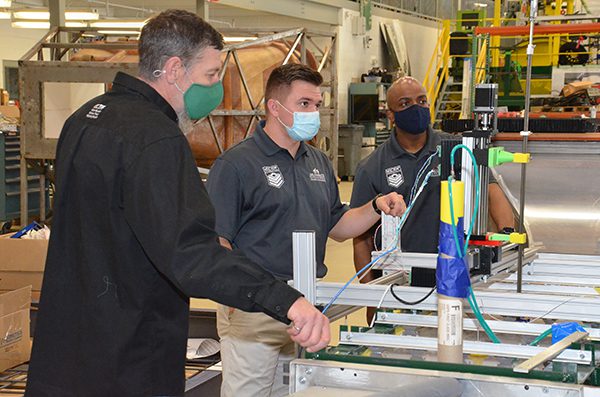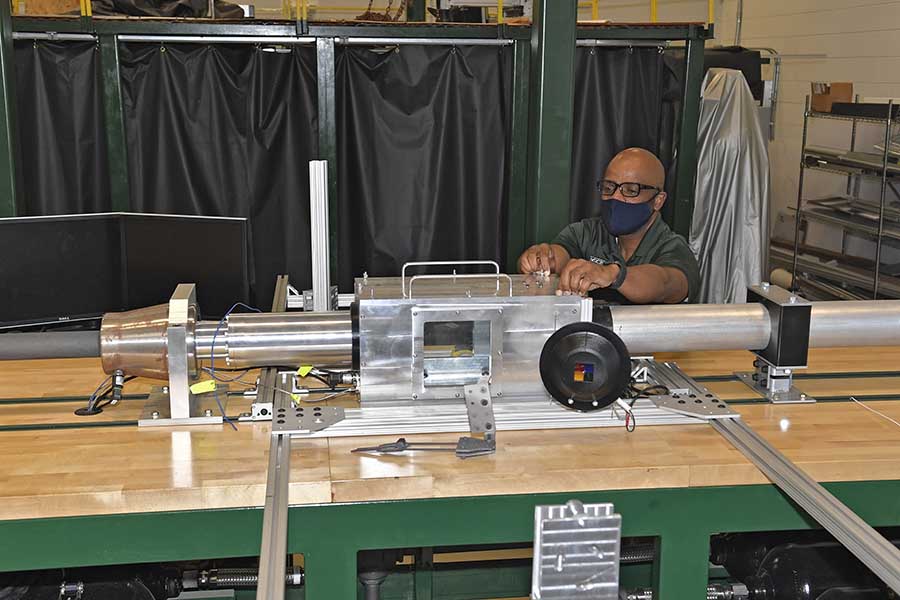Serving Veterans Today and Every Day

By: Paul Nowell
As the U.S. military develops the sophisticated weapon systems of the future, UNC Charlotte engineering students, including veteran Jason Solomon, are on the forefront of cutting-edge research in the field.
In January 2019, Solomon, then an undergraduate, was chosen to lead the Hypersonic Wind Tunnel Senior Design Project in The William States Lee College of Engineering. His five-member student team built a compact blowdown hypersonic wind tunnel capable of achieving Mach 3, 5 and 7.
Earlier this semester, the University was awarded a new grant, Shaping Experiential Research for Veteran Education (SERVE). SERVE was awarded $750,000 over three years from the ONR Navy and Marine Corps STEM Education and Workforce program in a partnership between UNC Charlotte and the University of Tennessee.
With this grant, veteran students pursuing degrees in STEM fields will have the chance to perform research that addresses priorities of the U.S. Navy, and through that research experience the veteran students will be encouraged to continue their education in graduate programs. This grant offers students from UNC Charlotte the opportunity to work in labs on campus, or at Tennessee.
Now a graduate student and a grant research assistant, Solomon, an early entry mechanical engineering master’s student, has been a beneficiary of two ONR grants.
On this Veteran’s Day, the University, which was founded in 1946 as a resource for continuing education for returning World War II veterans, recognizes the contributions of students and alumni who served and will continue to contribute in the future.
One of Solomon’s mentors is engineering professor Jerry Dahlberg, a 20-year Army veteran who obtained his undergraduate and graduate degrees at UNC Charlotte and now is one of the principal investigators on the ONR grants.
“When I first came to UNC Charlotte, the veterans office was very small and understaffed,” Dahlberg said. “I had a hard time transitioning from 20 years of active duty service to higher education. As a professor, I can provide services to students that are going through the same thing I went through, and I can lighten their load to help ensure success.“

Solomon discussed his military service and how University mentors such as Dahlberg positioned him to excel in the field:
Can you share your personal story, as a veteran coming to the University and specifically to the Lee College of Engineering?
“I joined the Army Reserves at the age of 17, back in 1998. I was still in high school. I started off as a mechanic then transitioned to a HR specialist in 2003. Then I got out of the Army in 2008 and started working on my civilian career as an HR administrator. After working in HR, career services and chemical industry, I felt I needed a change. I noticed that my GI bill was untouched. So I submitted my application to UNC Charlotte and the rest is history.”
How has the investment paid off?
“By utilizing the veteran benefits and services that UNC Charlotte offers I’ve been able register for classes early, network with military defense engineering contractors, attend grad school on an ONR grant and help other veterans that are following in my footsteps.”
Can you describe your project and how it will benefit the U.S. Navy or other segments of society?
“My senior design capstone project was building a Benchmark Compact Educational Hypersonic Wind Tunnel. This project was funded by the Office of Navy Research and cost approximately $40,000 to build. The sole purpose of this machine is to train UNC Charlotte graduate students to become hypersonic researchers.”
How do UNC Charlotte and the Lee College of Engineering provide fertile ground for veterans to succeed in STEM research and ultimately their careers?
“The College of Engineering provides senior design projects, summer research projects, student organizations, research opportunities, tutoring, financial assistance, traveling opportunities, networking and great social groups for military veterans who are studying STEM topics.”
What kind of direction or other assistance have you received from faculty members such as Jerry Dahlberg?
“Without Dr. Dahlberg, the veteran programs for STEM students would not exist. He is the foundation of support for veteran students. I met Dr. Dahlberg while he was finishing his doctorate in mechanical engineering. He was my teaching assistant for manufacturing systems. Since meeting him in that class, I’ve met with NASA, Raytheon, Lockheed Martin, Boeing and Northrup Grumman, all of which offered me opportunities to apply for positions they thought were great fit for my skills.”
How does peer mentoring factor into the program’s success? Has it benefited you in your research and, specifically, on this project?
“Jerry was a mentor to me before he knew I was a veteran during my sophomore year. As a veteran, he has not only pointed out the multitude of veteran benefits and programs at UNC Charlotte, but he has also taken time out to guide me through the process of joining these programs. His input and suggestions for our project were critical in its construction and testing. Overall, Jerry is the go-to guy for all veteran engineering students, from personal to academic issues. I often say that without him, obtaining my undergraduate degree would have been next to impossible. He has gone through the process from undergraduate to graduate to professor. He knows what most students are going through and can help them from multiple perspectives.”
Does your participation in this grant program give you a leg up on your career aspirations?
The grant program provides veterans with many benefits that traditional students don’t receive. Because most veterans are students that have already worked prior to starting school, I think it makes networking and finding work a bit easier. I think this notion is amplified in that each veteran has their own network to interconnect with versus the non-traditional student that transitioned from high school to college.”
For information about veteran services at UNC Charlotte, visit veterans.uncc.edu.